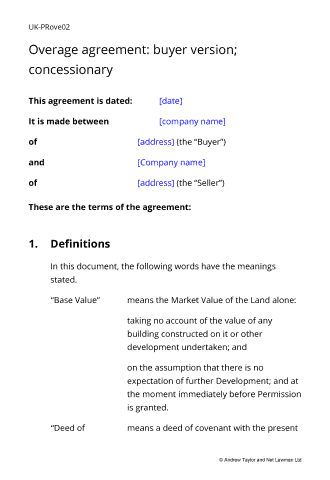Overage agreement

Document overview

 England & Wales
England & Wales

- Length:7 pages (1950 words)
- Available in:
 Microsoft Word DOCX
Microsoft Word DOCX Apple Pages
Apple Pages RTF
RTF

If the document isn’t right for your circumstances for any reason, just tell us and we’ll refund you in full immediately.

We avoid legal terminology unless necessary. Plain English makes our documents easy to understand, easy to edit and more likely to be accepted.

You don’t need legal knowledge to use our documents. We explain what to edit and how in the guidance notes included at the end of the document.

Email us with questions about editing your document. Use our Lawyer Assist service if you’d like our legal team to check your document will do as you intend.

Our documents comply with the latest relevant law. Our lawyers regularly review how new law affects each document in our library.
About this document
Most overage agreements are favoured by property sellers in order to obtain the maximum present and future value from the sale of their land.
This agreement has been written for a buyer, because it is more likely than not that in a speculative offer, it is he or she who initiates the deal. It is therefore strongly in the interest of the buyer to produce the contract in a version he or she can live with. The parties can then negotiate the finer points based on that document.
It is suitable for any land deal, regardless of value. The terms could be incorporated in the contract for sale or the document could be used as a stand-alone agreement.
The terms provide for payments on repeated sales over as long a time period as you wish. However, the buyer should avoid being drawn in to a long overage period, because a future owner of a developed part, such as a house or workshop owner, may have difficulty in finding a mortgage lender on an overaged property.
The aim of this document is to provide a framework which entices future owners to develop and not one which ensures that they do not develop.
Advantages of this agreement
The advantages of this contract are with the buyer. In particular:
interest is not payable from the moment planning permission is granted
overage does not bite on the value of the buildings, but only on an increase in the land value
there is no obligation for the buyer to try to register the contract at the Land Registry. (That is likely to be impossible, but is nevertheless demanded by some solicitors)
in calculating overage, credit is given for money expended in obtaining the permission, such as professional and planning fees
When to use
Use this contract when you buy any land. The land does not have to be open land. The document is just as binding when the land is an old industrial shed or a perfectly good office building that stands in the way of larger development.
The benefit of using an overage agreement is that the buyer is not at risk of buying at a price which does not reflect the current value, while the seller can look for a future share of future value without the expense and work involved in achieving it.
This contract is in plain English. Nonetheless it is a sophisticated document drawn by a property specialist solicitor. It is suitable whether you are an individual or work through a company incorporated in England or Wales.
If you are the existing property owner, we also sell a version of the agreement that favours the seller.
Contents
- Definitions
- Interpretation
- Payment terms
- Surveyor’s valuation
- Transferees’ continuing liability
- Release to enable transfer
- Seller’s costs
- Miscellaneous matters

Choose the level of support you need
Document Only
This document
Detailed guidance notes explaining how to edit each paragraph
Lawyer Assist
This document
Detailed guidance notes explaining how to edit each paragraph
Unlimited email support - ask our legal team any question related to completing the document
- Review of your edited document by our legal team including:
- reporting on whether your changes comply with the law
- answering your questions about how to word a new clause or achieve an outcome
- checking that your use of defined terms is correct and consistent
- correcting spelling mistakes
- reformatting the document ready to sign
All rights reserved
